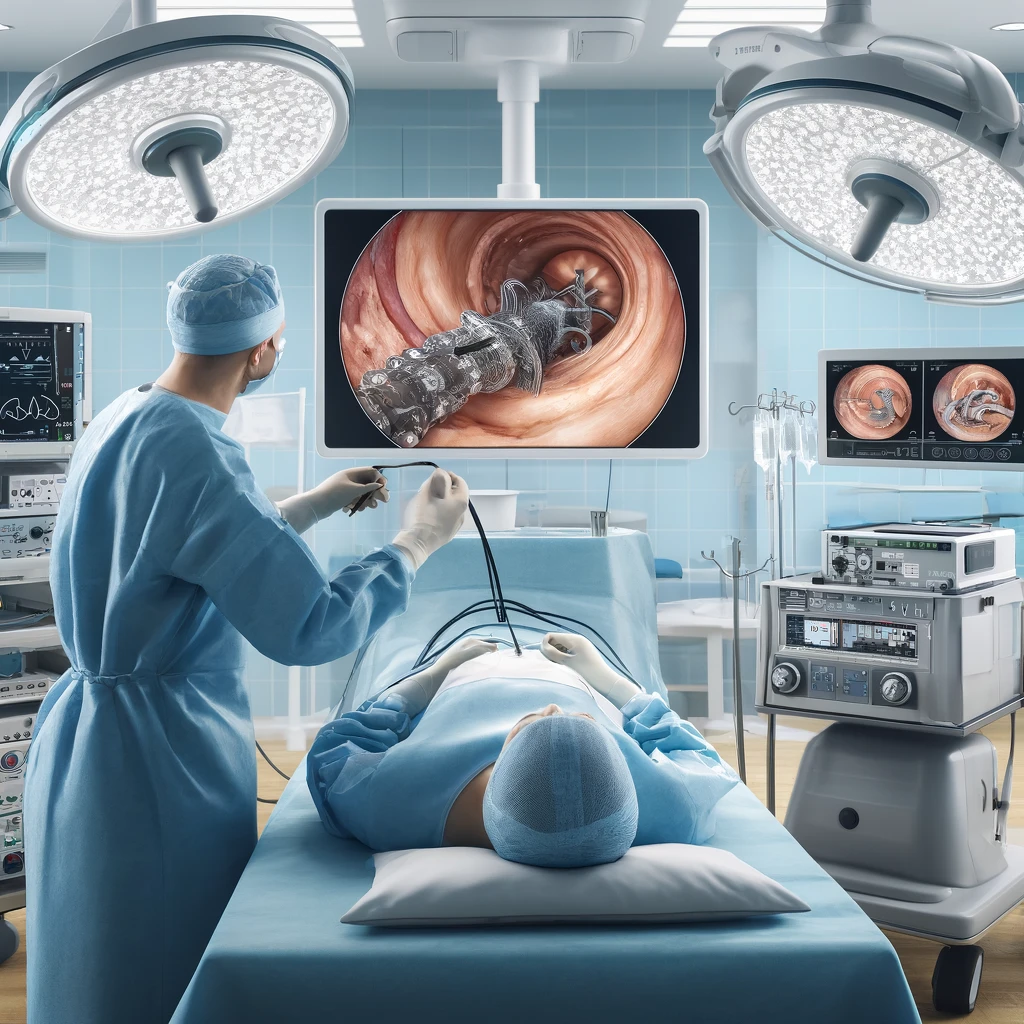Diagnostic laparoscopy is a minimally invasive surgical procedure that allows doctors to examine internal abdominal organs with the help of a laparoscope. It is used for both diagnosis and treatment of various medical conditions.
Understanding Diagnostic Laparoscopy
Diagnostic laparoscopy is performed using a thin, flexible tube called a laparoscope, which has a camera attached to its end. This device is inserted through a small incision in the abdomen, allowing surgeons to view internal organs on a monitor in real time. Unlike traditional open surgery, laparoscopy requires only a few small cuts, making it less invasive and reducing recovery time.
This procedure is commonly used in gynaecology, gastroenterology, and general surgery to detect abnormalities that may not be visible through imaging tests like ultrasound, CT scans, or MRIs. If necessary, minor corrective procedures can also be performed during the same session.

Importance of Diagnostic Laparoscopy
Laparoscopic surgery is a valuable tool for identifying the causes of unexplained pain, infertility, infections, and tumors. It provides a clear and direct visualization of the internal organs without requiring large incisions.
Causes and Risk Factors for Conditions Requiring Diagnostic Laparoscopy
Some common conditions that may require diagnostic laparoscopy include:
- Unexplained abdominal pain – Persistent pain without an identifiable cause through non-invasive tests.
- Endometriosis – A condition where tissue similar to the uterine lining grows outside the uterus, causing pain and fertility issues.
- Ovarian cysts or tumours – Fluid-filled sacs or abnormal growths in the ovaries that may require further evaluation.
- Appendicitis – Inflammation of the appendix, often requiring surgical removal.
- Ectopic pregnancy – A pregnancy occurring outside the uterus, which can be life-threatening if untreated.
- Liver disease – Various liver conditions that may need assessment for damage or abnormalities.
- Gallbladder disease – Issues such as gallstones or inflammation that affect digestion.
Symptoms That May Require Diagnostic Laparoscopy
Doctors may recommend laparoscopy if you experience:
- Internal bleeding or swelling – Unexplained internal haemorrhage that could indicate a serious condition.
- Chronic abdominal or pelvic pain – Long-term pain that does not resolve with medication or other treatments.
- Unexplained infertility – Difficulty conceiving with no clear cause detected through imaging tests.
- Persistent bloating or digestive issues – Ongoing gastrointestinal discomfort that needs further evaluation.
- Abnormal imaging results – Unclear findings in ultrasound, CT scan, or MRI that require direct visualization.
Diagnosis and Laboratory Tests Required Before Diagnostic Laparoscopy
Before undergoing diagnostic laparoscopy, doctors may recommend a series of tests to ensure patient safety and confirm the need for the procedure. These tests may include:
- Blood Tests – To check for infections, anaemia, clotting disorders, and overall health status.
- Urine Tests – To rule out urinary tract infections or kidney-related issues.
- Ultrasound or CT Scan – To provide initial imaging of abdominal or pelvic organs and identify abnormalities.
- MRI Scan – In some cases, for detailed imaging of soft tissues.
- Electrocardiogram (ECG) – To assess heart function, especially in patients with existing cardiovascular conditions.
- Pregnancy Test – For women of childbearing age to rule out pregnancy before the procedure.
- Liver and Kidney Function Tests – To assess the ability of these organs to process anaesthesia and medications.
Diagnosis Through Diagnostic Laparoscopy
Laparoscopy helps diagnose various medical conditions by allowing direct visualization of organs. Doctors may also perform a biopsy during the procedure to collect tissue samples for further analysis.
Surgical Treatment Using Diagnostic Laparoscopy
If a medical issue is identified, laparoscopic surgery can be used to treat conditions such as:
- Gallbladder removal – Treatment for gallstones or gallbladder inflammation.
- Removal of ovarian cysts or fibroids – Minimally invasive excision of abnormal growths in the reproductive system.
- Treatment of endometriosis – Cauterization or removal of endometrial tissue growing outside the uterus.
- Appendectomy (removal of the appendix) – Laparoscopic removal of an inflamed appendix.
- Hernia repair – Correction of weakened abdominal wall areas to prevent organ protrusion.
Is Laparoscopic Surgery the Best Choice for Treatment?
Laparoscopic procedures are preferred over open surgeries due to:
- Faster recovery – Patients heal more quickly compared to traditional surgery.
- Less pain and scarring – Smaller incisions mean reduced postoperative discomfort and minimal scars.
- Shorter hospital stay – Most patients can return home the same day or within 24 hours.
- Lower risk of infection and complications – Less exposure of internal organs reduces infection risks.
Can Conditions Diagnosed with Laparoscopy Be Treated Without Surgery?
- Medication-based management – Some conditions, such as mild endometriosis, may be controlled with hormonal therapy.
- Lifestyle modifications – Diet and exercise changes can sometimes help manage digestive issues or liver conditions.
- Minimally invasive treatments – Certain conditions, like small ovarian cysts, may resolve without surgery under medical supervision.
Pre and Post-Surgery Precautions
Pre-Surgery Precautions:
- Follow dietary restrictions – Patients should avoid food and drinks for at least 6-8 hours before surgery.
- Medication adjustments – Inform your doctor about any ongoing medications; some, like blood thinners, may need to be stopped temporarily.
- Hygiene measures – Shower with antibacterial soap the night before surgery to minimize infection risk.
- Avoid smoking and alcohol – Refrain from smoking and alcohol consumption before surgery, as they can impact anaesthesia and healing.
- Arrange transportation – Since anaesthesia can cause drowsiness, have someone accompany you for post-surgery assistance.
Post-Surgery Precautions:
- Avoid heavy lifting – Refrain from lifting heavy objects or engaging in intense physical activities for at least a week.
- Follow prescribed medications – Take antibiotics and pain relievers as directed to manage pain and prevent infection.
- Rest adequately – Allow your body to recover and avoid strenuous activities for a few days.
- Monitor for complications – Watch for signs of infection, excessive bleeding, or severe pain and contact your doctor if needed.
- Stay hydrated and eat light meals – Start with easily digestible foods and gradually return to a regular diet.
Recovery After Diagnostic Laparoscopy
- Most patients go home the same day – Hospitalization is rarely required unless complications arise.
- Mild discomfort, bloating, or shoulder pain may occur – This results from the gas used to expand the abdomen during surgery.
- Full recovery typically takes 1-2 weeks – Patients can usually return to normal activities within a short period.
- Avoid strenuous activity for a few days – Heavy lifting and intense exercise should be postponed until clearance from the doctor.
Possible Complications of Diagnostic Laparoscopy
Although rare, potential complications include:
- Blood clot formation – Patients are encouraged to move around post-surgery to prevent clotting issues.
- Infection or bleeding at incision sites – Proper wound care minimizes the risk of post-surgical infection.
- Internal organ injury – Rare but possible injury to surrounding organs during the procedure.
- Adverse reaction to anaesthesia – Some patients may experience nausea, dizziness, or allergic reactions.
Why Choose KK Virat Hospital for Diagnostic Laparoscopy?
- Expert Surgeons – Our team includes highly skilled laparoscopic specialists with years of experience.
- State-of-the-Art Facilities – We use advanced medical technology to ensure accurate diagnosis and effective treatment.
- Minimal Recovery Time – Our minimally invasive approach ensures a quick recovery with reduced hospital stays.
- Personalized Patient Care – We prioritize patient safety and comfort with dedicated pre- and post-surgery care.
- We provide insurance support, flexible payment options, and our follow-up consultations ensure a smooth recovery.
Book Your Appointment Today
If you are experiencing symptoms that require diagnostic laparoscopy, schedule a consultation with our expert surgeons at KK Virat Hospital, Karimnagar. Contact us today to book your appointment and receive the best medical care tailored to your needs.
- Call Us Directly: Get in touch with our medical coordinators to schedule an appointment with an expert urologist.
- Direct Visit: You can visit our hospital directly by carrying your previous medical records if you have a medical history. However, admission will be based on the doctor’s recommendation.
What is diagnostic laparoscopy, and why is it performed?
Diagnostic laparoscopy is a minimally invasive procedure that helps doctors examine internal organs in the abdomen and pelvis to diagnose conditions such as endometriosis, ovarian cysts, unexplained abdominal pain, and infertility.
How long does a diagnostic laparoscopy take?
The procedure typically takes 30 to 60 minutes, depending on the complexity of the examination and whether additional surgical steps are required.
Is diagnostic laparoscopy painful?
Since the procedure is performed under anaesthesia, you will not feel pain during surgery. However, mild discomfort, bloating, or soreness may be experienced after the procedure, which usually subsides within a few days.
How should I prepare for a diagnostic laparoscopy?
Patients are advised to avoid eating or drinking for at least 6-8 hours before the surgery. Your doctor may also provide specific instructions regarding medications and hygiene practices.
What is the recovery time after a diagnostic laparoscopy?
Most patients recover within a few days and can return to normal activities in about a week. Full recovery may take 2-4 weeks, depending on individual health conditions.
What are the risks or complications associated with diagnostic laparoscopy?
While generally safe, potential risks include infection, bleeding, organ injury, or reactions to anaesthesia. However, these complications are rare when performed by experienced surgeons.
Can I get pregnant after undergoing diagnostic laparoscopy?
Yes, many women undergo this procedure to diagnose and treat conditions affecting fertility. If any abnormalities are corrected during laparoscopy, it may even improve the chances of conception.
Will I have scars after a diagnostic laparoscopy?
Laparoscopy involves small incisions, which leave minimal scars that usually fade over time. Proper post-operative care can further reduce scar visibility.
When should I seek medical attention after a diagnostic laparoscopy?
If you experience severe pain, heavy bleeding, fever, or persistent nausea and vomiting after the procedure, contact your doctor immediately.
Why choose KK Virat Hospital for diagnostic laparoscopy in Karimnagar?
KK Virat Hospital offers advanced laparoscopic technology, experienced surgeons, personalized patient care, and a quick recovery process, making it a top choice for this procedure.


